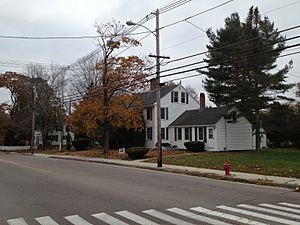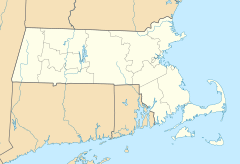Wheelockville, Massachusetts facts for kids
Quick facts for kids
Wheelockville
|
|
|---|---|
|
Village
|
|

Two wooden houses on Mendon Street typify the Wheelockville Historic District, (Mendon and Henry Streets)
|
|
| Country | United States |
| State | Massachusetts |
| County | Worcester |
| Elevation | 246 ft (75 m) |
| Time zone | UTC-5 (Eastern (EST)) |
| • Summer (DST) | UTC-4 (EDT) |
| ZIP codes |
01569
|
| GNIS feature ID | 611599 |
Wheelockville is a small village located in the town of Uxbridge, Massachusetts, in the United States. A part of the village, especially around Mendon and Henry Streets, is recognized as the Wheelockville Historic District. This means it's a special area with old buildings and history.
Wheelockville gets its everyday services like fire, police, and schools from the larger town of Uxbridge. The village is also home to other smaller areas that used to be mill villages, such as Hecla and Elmdale.
Contents
Discovering Wheelockville's Past
Wheelockville is very important to the early history of American industry. Some of the very first textile mills in Uxbridge were built right here. These mills made cloth and yarn.
The Wheelock Family and Early Mills
The first woolen mill in the entire Blackstone Valley was started in Uxbridge in 1809 by Daniel Day. This mill was in the area now called "Elmdale," which is part of Wheelockville. Daniel Day's son-in-law, Jerry Wheelock, joined him in the business. Jerry Wheelock was one of the first members of the Wheelock family to become a textile maker. The village of Wheelockville is named after his family.
Another important Wheelock family member was Lt. Simeon Wheelock. He was a blacksmith in Uxbridge and fought in the American Revolutionary War at Lexington. He also took part in Shays' Rebellion, which started in Uxbridge.
The Blackstone Valley: Birthplace of Industry
The Blackstone Valley is a very special place in American history. It's where the country's first industrial revolution really took off. Wheelockville is right in the middle of this important valley. Two rivers that powered these early mills, the Blackstone River and the West River (Massachusetts), flow through Wheelockville.
The business started by Jerry Wheelock and Daniel Day is still around today! It's now called Berrocco, Inc., and it's a company that makes yarn.
Exploring Hecla and Elmdale Sections
The Hecla Mill was once a big factory located where the Uxbridge Department of Public Works and D'Alfonso Park are today. This mill was also known as the American Woolen Company. Hecla was also home to Hilena Lowell's shoe factory.
The Waucantuck Mill Complex came from the original Luke Taft Mill. Sadly, the Waucantuck Mill was taken down in 2010 because of harmful waste. Only a storage building remains from the original Luke Taft business. Daniel Day's mill later became Scott's Woolen Mill. Today, the old Scott's Mill in "Elmdale" still has some businesses connected to the mills that used to be very busy there, like the Bernat Yarn company, which was once the second-largest yarn factory in the country.
Wheelockville's Historic Mills
The earliest textile mills in Wheelockville, in order of when they were built, were:
- The Daniel Day (manufacturer) mill, built in 1809. This was the first local mill to prepare wool for spinning, located in Elmdale.
- The Luke Taft Mill, built in 1825.
- The later Waucantuck Mill, built near the Luke Taft Mill site.
These early mills were all on the West River (Massachusetts) and used water power to run their machines. In 1852, the Stanley Woolen mill was built by Moses Taft nearby on the Blackstone River.
Industrial Era Photos
-
"Elmdale", site of 1809 Daniel Day Mill. Daniel Day (Manufacturer) started the first woolen mill in the Blackstone Valley later also known as "Scott's Mill, the current factory recently housed Berrocoo Inc. a 200 year family enterprise, now international woolens.
-
Stanely Woolen Mill, Nov. 11, 2009, founded by Moses Taft, in 1852 at Uxbridge, MA, with view of the Blackstone Canal; vertical integration of woolens to clothing was pioneered here
-
Waucantuck Mill Complex, A storage building is all that remains of the original site of the 1825 Luke Taft Mill where wash and wear fabrics were pioneered in the USA
Three mills built here are very important to the early history of the Blackstone Valley:
- The Daniel Day Mill (1809)
- The Luke Taft Mill (1825)
- The Moses Taft Mill (1852)
These three mills were connected to the famous American Taft family. Later, the Wheelock family owned the Moses Taft Mill, and that's how the village got the name Wheelockville. However, that mill is officially known as the Calumet Mill or Central Woolen Mills District.
The Waucantuck Mill Complex was near where one of the original Luke Taft Mills stood. It was torn down in 2010 because of harmful waste. The first mills built by Daniel Day and Luke Taft used water power from the local rivers. This way of running mills, with dams, spillways, and nearby mill villages, was first developed in Slatersville, Rhode Island, by John and Samuel Slater. It became known as "The Rhode Island System".
The Moses Taft Mill was also called the Calumet Mill. The Wheelock family is an important early American family with deep roots in this historic community. Wheelockville and Uxbridge are part of the Blackstone River Valley National Heritage Corridor, which is managed by the National Park Service. The Blackstone Valley is known as the first industrialized region in the United States.
The Moses Taft mill worked non-stop, 24 hours a day, 7 days a week, during the American Civil War. It made the blue uniforms for the Union soldiers. The same mill later made khaki uniforms and cloth for the armies of France and Italy during World War I. This village was even used as a filming location for two movies in the 1970s: The Great Gatsby (1974 film) and Oliver's Story.
 | Misty Copeland |
 | Raven Wilkinson |
 | Debra Austin |
 | Aesha Ash |







